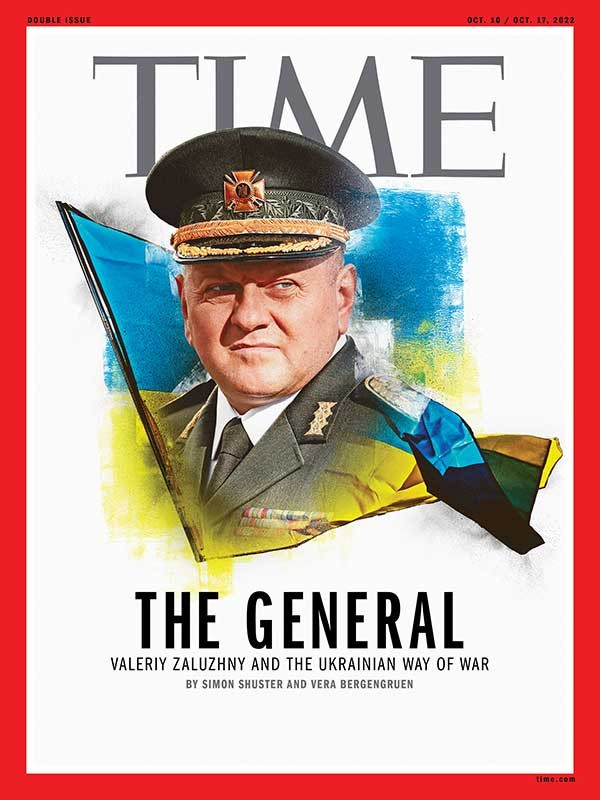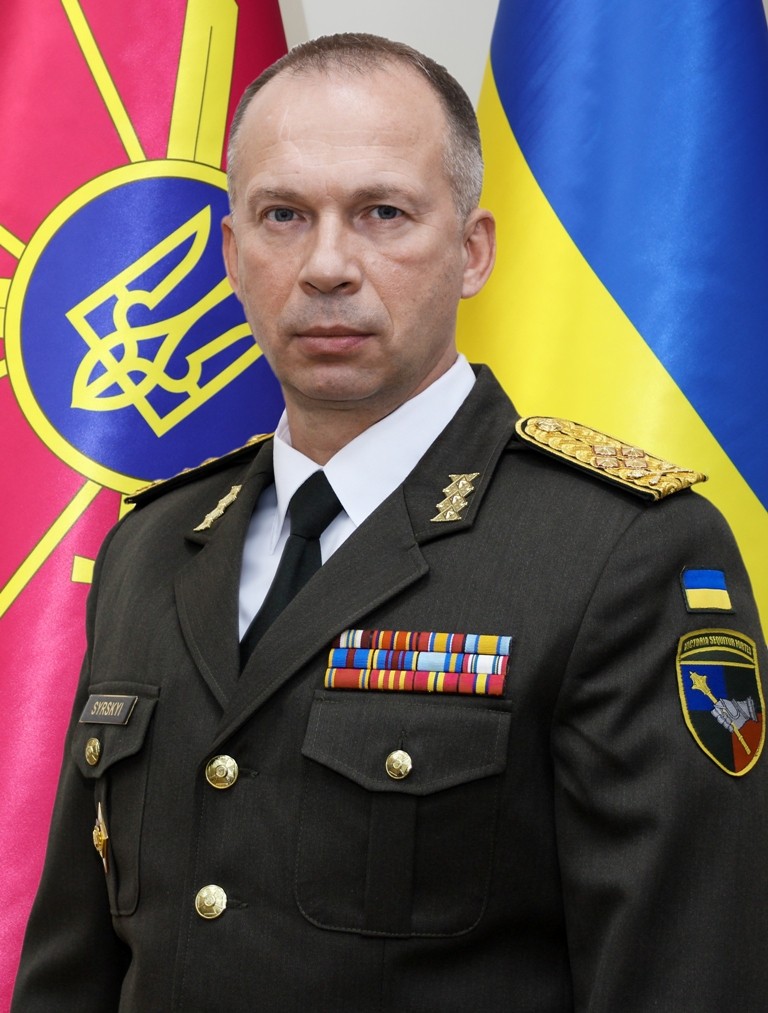თაიმსის სტატიას ვკითხულობ, ზალუჟნიზე:
 https://time.com/6216213/ukraine-military-v...inkId=183047256
https://time.com/6216213/ukraine-military-v...inkId=183047256დასავლეთი რომ იწერს ქულებს, რომ სამხედრო "მოქილობა" ასწავლეს უკრებს, ტრუხაა:
Zaluzhny rose through the ranks with a new generation of officers that bridged very different eras: raised in Soviet Ukraine, but eager to shed USSR military dogma. For a master’s thesis, Zaluzhny analyzed U.S. military structure. Seeing how Ukrainian forces were still weighed down by the Soviet model that relied on rigid, top-heavy decision-making, he began to implement changes to mirror the forces of U.S. and NATO partners.
Zaluzhny worked his way from commanding a platoon to leading the country’s forces on the eastern front following Russia’s annexation of Crimea in 2014. In that role, he developed junior officers and encouraged more agile decision-making, pushing down authority to commanders on the ground. Unlike in the Russian army, sergeants would not be “scapegoats,” but rather real deputies meant to create a pipeline of military talent, he said in a 2020 interview published by the Ukrainian Defense Ministry. “There is no going back,” he said, to “the army of 2013.”
იუმორრისტობა უნდოდაო:
Born on a Soviet military garrison in northern Ukraine in 1973, he says he had dreams of becoming a comedian, much like Zelensky himself. Instead, he followed in the footsteps of his military family, entering the academy in Odessa in the 1990s as the Soviet Union collapsed and Ukraine descended into crisis.
გერასიმოვზე პოზიტიური კომენტარი, ნაღდია:
In his office, he keeps the collected works of General Valery Gerasimov, the head of the Russian armed forces, who is 17 years his senior. “I was raised on Russian military doctrine, and I still think that the science of war is all located in Russia,” Zaluzhny says. “I learned from Gerasimov. I read everything he ever wrote … He is the smartest of men, and my expectations of him were enormous.”
ზელენსკიზე ახსენეს, რომ სამხედროებს ენდობათ და ხელს არ უშლით.
რუსეთთან ომისთვის მზადებაზე: ნებართვა სამხედროებს რომ ეგრევე გახსნან საპასუხო ცეცხლი და ა.შ.:
Zaluzhny was part of a corps of Ukrainian officers who viewed it as a matter of time. Within weeks of taking up his post, he began to implement key changes. Officers would be free to return fire “with any available weapons” if they came under attack, with no need for permission from senior commanders. “We needed to knock down their desire to attack,” Zaluzhny says. “We also needed to show our teeth.”
ომის დაწყებამდე იარაღი/თვითფრინავები/ჰაერსაწინააღმდეგო სისტემები და ა.შ. გადამალეს:
After the outburst, the generals picked up their preparations. They relocated and camouflaged military hardware, moving troops and weapons out of their bases and sending them on tours around the country. This included aircraft, tanks, and armored vehicles, as well as the antiaircraft batteries Ukraine would soon need to maintain control of its skies. “There’s no mistaking the smell of war,” Zaluzhny says, “and it was already in the air.” But when it came to the details of his strategy, Zaluzhny held them close. “I was afraid that we would lose the element of surprise,” he says. “We needed the adversary to think that we are all deployed in our usual bases, smoking grass, watching TV, and posting on Facebook.”
ზალუჟნის სტრატეგია იყო კიივის დაცვა და დანარჩენ მიმართულებებზე მტრისთვის რაც შეიძლება დიდი ზარალის მიყენება, მტრის ლოჯისტიკის ხაზების გაწელვა:
When the invasion started on the morning of Feb. 24, the general had two strategic goals for Ukraine’s defense. “We could not allow Kyiv to fall,” he said. “And, on all the other vectors, we had to spill their blood, even if in some places it would require losing territory.” The aim, in other words, was to allow the Russians to advance and then destroy their columns in the front and supply lines in the rear. By the sixth day of the invasion, he concluded it was working. The Russians had failed to take airports around Kyiv and had advanced deep enough to begin straining supply lines, leaving them exposed.
მილი (აშშ-ს თავდაცვის მინისტრს) გაკვირვებული დარჩა უკრაინელების წარმატებული ქმედებებით.
მილიმ ჰკითხა: ევაკუაციას ხომ არ აპირებო?
ზალუჟნიმ: არ მესმის რას მეკითხებიო, ჩემთვის ომი 2014-ში დაიწყო და არც მაშინ ვაპირებდი
Milley, Zaluzhny’s U.S. counterpart, was in some ways astounded when he saw the Ukrainians holding out. He asked Zaluzhny whether he planned to evacuate to safer ground. “I told him, ‘I don’t understand you,’” Zaluzhny says. “For me the war started in 2014 … I didn’t run away then, and I’m not going to run now.”
ზალუჟნიც კი დარჩა გაკვირვებული მორდორის ქმედებებით. ჩამოშლილი ლოჯისტიკის მიუხედავად, უკან არ იხევდნენ (ისე, აქვე აღსანიშნავია, რომ რუსეთის გენშტაბის უფროსი იყო გერასიმოვი, კაკ რაზ ის ტიპი, ვიზეც ზალუჟნი ამბობდა რომ უჭკვიანესია. ამ ფაქტს ადვილი ახსნა აქვს: საბედნიეროდ პუტლერა ერეოდა გენშტაბის გეგმებში).
Milley, Zaluzhny’s U.S. counterpart, was in some ways astounded when he saw the Ukrainians holding out. He asked Zaluzhny whether he planned to evacuate to safer ground. “I told him, ‘I don’t understand you,’” Zaluzhny says. “For me the war started in 2014 … I didn’t run away then, and I’m not going to run now.”
ზალუჟნის წარმოდგენა მომავალზე, ეს ბოლო ომი არ იქნებაო:
For his part, Zaluzhny is girding for a long and bloody slog. “Knowing what I know firsthand about the Russians, our victory will not be final,” he told TIME. “Our victory will be an opportunity to take a breath and prepare for the next war.”
----------------------------------------------
ისე კი, გაიცანით ალექსანდრე სირსკი, კიევის დაცვასაც ხელმძღვანელობდა და ხარკოვის კონტრშეტევასაც:
General Oleksandr Syrskyi, the commander of Ukraine’s ground forces, who led the defense of Kyiv and, more recently, the counteroffensive in the east




 ·
·